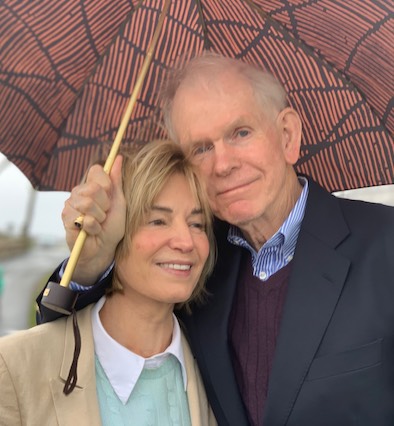Jeremy and Hanne Grantham
Trustees, Grantham Foundation
Featured Conversation
Taking Risks and Finding Leverage With Climate Philanthropy
Why did you make climate a priority for your philanthropy?
Jeremy: In the mid-1990s, we went with our three children on a series of trips, including the Amazon, the Galapagos, the Andes, on a safari in Africa, and Borneo. Along the way, we’d pass through forests that were still more or less intact, as well as forests that had been chopped down into logs on the riverside. By the end of that window, we were all thoroughly convinced that nature was under severe attack—we realized we had all become environmentalists.
Hanne: That gave us a topic on which we could focus. Anybody who starts a foundation needs to narrow down, otherwise you’re just going to go all over the place. So, when we started our foundation in 1997, the environment was our focus from the beginning.
Jeremy: By about year five of environmental giving, so in the early 2000s, we found ourselves obsessing about climate change. By going into nature, using our eyes, talking to experts, and perusing the data, we came to the inevitable conclusion that climate change is the bedrock on which all protection of nature rests. So about 25 years ago, climate change became the bedrock of our philanthropy.
How would you describe your approach to climate philanthropy?
Jeremy: We try to make bigger, longer grants and look for leverage—emerging or overlooked areas with high potential.
For example, in 2007 we helped start The Grantham Institute – Climate Change and the Environment at Imperial College in London because we realized there was not enough research on the subject. It was the first academic institution in the United Kingdom to have climate change in its name, which proved to be really important to mobilizing broader support for mitigating climate change before most institutions were thinking of it.
Today, up to 20 percent of our foundation’s grant program goes to jumpstarting green enterprises. We try to find terrific ideas in the great research universities that are just shy of being able to go into a commercial effort. The funding is to help innovators do their final research, fine-tune their ideas, and get going. It targets an area that commercial venture capital firms don’t have a budget for and is exactly up our street.
What are you most proud of in your philanthropic journey?
Hanne: I’m proud of the fact that we ask our team and ourselves almost once a month, “What is really crucial right now?” We’re more flexible than most foundations.
Jeremy: Our foundation invests capital in ways that drive our mission forward. We have built a team to make terrific green investments, as well as grants because we’ve got to set a good example and be as influential as we can.
We’re also so proud that all three of our children are totally on board. It guarantees not only that our foundation and trust are more aggressive than anybody else while we’re around, but also that we have another generation who will feel that it’s a matter of the greatest urgency.
What are you optimistic about today?
Jeremy: I am confident that we will end up with a plentiful supply of cheap green energy. I recognized 10 years ago that progress was substantially faster than the world realized, and it’s been faster than I would have imagined. Energy storage costs, for example, have come down drastically and will continue to decrease—enough for solar and wind to get the job done and things like fusion, geothermal, and other energy improvements are backing them up. This is a source of great optimism because cheap green energy addresses the difficult decarbonizing problems of steel, cement, and all these other industrial processes.
What would you say to someone who is just starting to think about giving to climate?
Jeremy: Number one is that time is precious. If you make a mistake, the world will not end, but if you dither around and do nothing, it very well may end. So, pick a useful topic, start learning by practice, move fast, and take some risks.
I’d also want them to know that this field is one of the most important things you could possibly commit your time and money to—and it’s also thoroughly exciting! That really is a win-win from a human point of view.
“
Climate change is the bedrock on which all protection of nature rests.
About
Jeremy is co-founder and chairman of the board at GMO, an investment management company headquartered in Boston, MA. Hanne received her undergraduate and graduate degrees in literature from Brandeis University. In 1997, they established the Grantham Foundation for the Protection of the Environment, which has an emphasis on international initiatives. The Granthams are signatories of The Giving Pledge and have given over 90 percent of their wealth to the environment.

“
Climate change is the bedrock on which all protection of nature rests.